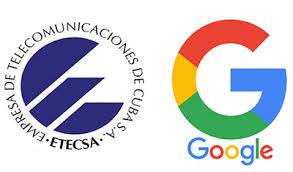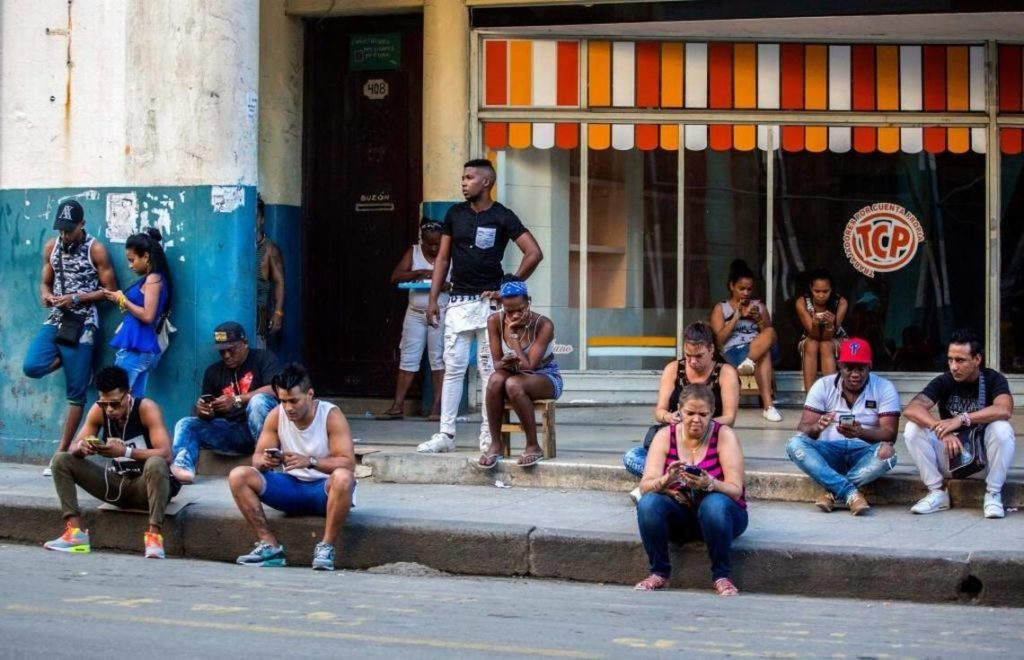 INTERNET EN CUBA: DETALLES VERIDICOS ANTE EL MEMORANDO FIRMADO ENTRE GOOGLE Y ETECSA.
INTERNET EN CUBA: DETALLES VERIDICOS ANTE EL MEMORANDO FIRMADO ENTRE GOOGLE Y ETECSA.
El memorando de entendimiento firmado este jueves por directivos del gigante tecnológico y el monopolio estatal de telecomunicaciones cubanas, Etecsa, abre las puertas a “la negociación de un posterior acuerdo de servicio de intercambio de tráfico de internet”, una práctica conocida como “peering”.
La interconexión no tiene fecha de momento y “será implementada cuando las condiciones técnicas así lo permitan”, refiere la escueta nota distribuida a los medios durante la firma del acuerdo, en la que no se permitieron preguntas.
La firma de este acuerdo supone un paso más en la apuesta de Google por la isla comunista pese al hostil giro de la política de Washington hacia La Habana desde la llegada a la Casa Blanca del republicano Donald Trump.
Trump ha endurecido las sanciones
Aunque la nueva administración estadounidense ha endurecido las sanciones contra la isla, se mantienen vigentes las directivas presidenciales firmadas por el anterior presidente, Barack Obama, para suavizar el embargo, entre ellas una que permite las inversiones de su país en Cuba en el área de las telecomunicaciones y la conectividad.
Aun despues de varios intentos de Google de comenzar un servicio publico a favor de la poblacion cubana, rechazados por las autoridades cubanas, hay indicios que la empresa ha tenido un papel destacado en el primer cara a cara de el nuevo presidente cubano, Miguel Díaz-Canel, con una delegación oficial de EE.UU. de visita en La Habana: fue en junio del año pasado, cuando recibió al senador republicano por Arizona Jeff Flake, a quien acompañaba el expresidente de Google, Eric Schmidt.
Schmidt aseguró entonces que Google quería hacer más para aumentar el acceso a internet en Cuba: “es importante que los cubanos puedan acceder a internet al mismo nivel que el resto del mundo. El talento del pueblo cubano podría mostrarse globalmente gracias a un mejor acceso”, fueron sus palabras.
Una de las cuestiones que está sobre la mesa es la posibilidad de conectar Cuba con un cable submarino -ahora mismo la isla depende fundamentalmente de uno con Venezuela cuya capacidad está saturada- pero de momento no ha trascendido en qué punto está esa negociación.
Meses más tarde Díaz-Canel se volvió a reunir con los máximos ejecutivos de Google y otras tecnológicas durante un viaje a Nueva York para asistir a la asamblea general de Naciones Unidas.
La isla, uno de los países más desconectados del mundo hasta hace poco tiempo, está inmersa en un proceso de informatización, impulso de la administración digital y aumento del acceso a internet que tuvo uno de sus hitos en diciembre pasado con la puesta en marcha del servicio 3G de acceso a la red.
La llegada del 3G ha propiciado un interesante fenómeno, hasta ahora inédito en las dinámicas sociales cubanas, ya que los ciudadanos han comenzado a opinar con mayor libertad, a denunciar los problemas del día a día e incluso a pedir cuentas por ellos a los dirigentes presentes en las redes sociales, comenzando por el presidente.
Además, desde 2015 se han ido multiplicando las zonas públicas con acceso wifi y también se oferta el acceso desde los hogares, prohibido durante años con contadas excepciones en caso de altos funcionarios y otros profesionales.
 INTERNET IN CUBA: DETAILS ABOUT THE MEMORANDUM SIGNED BETWEEN GOOGLE and ETECSA.
INTERNET IN CUBA: DETAILS ABOUT THE MEMORANDUM SIGNED BETWEEN GOOGLE and ETECSA.
The memorandum of understanding signed this Thursday by executives of the technological giant and the Cuban state telecommunications monopoly, Etecsa, opens the doors to “the negotiation of a subsequent agreement on Internet traffic exchange service”, a practice known as “peering” .
The interconnection has no date at the moment and “will be implemented when the technical conditions so permit”, refers the brief note distributed to the media during the signing of the agreement, in which no questions were allowed.
The signing of this agreement represents another step in Google’s bid for the communist island despite the hostile turn of Washington’s policy towards Havana since the arrival in the White House of Republican Donald Trump.
Trump has tightened the penalties
Although the new US administration has tightened sanctions against the island, the presidential directives signed by the former president, Barack Obama, remain in force to soften the embargo, including one that allows his country’s investments in Cuba in the area of telecommunications and connectivity.
Even after several attempts by Google to start a public service in favor of the Cuban population, rejected by the Cuban authorities, there are indications that the company has had a prominent role in the first face-off of the new Cuban president, Miguel Díaz- Canel, with an official US delegation visit to Havana: it was in June of last year, when he received the Republican senator from Arizona Jeff Flake, who was accompanied by the former president of Google, Eric Schmidt.
Schmidt said then that Google wanted to do more to increase Internet access in Cuba: “It is important that Cubans can access the Internet at the same level as the rest of the world. The talent of the Cuban people could be shown globally thanks to better access “, were his words.
One of the questions that is on the table is the possibility of connecting Cuba with a submarine cable – right now the island depends mainly on one with Venezuela whose capacity is saturated – but at the moment it has not transcended at what point that negotiation is.
Months later, Díaz-Canel met again with the top executives of Google and other technology executives during a trip to New York to attend the United Nations General Assembly.
The island, one of the most disconnected countries in the world until recently, is immersed in a process of computerization, promotion of digital administration and increased access to the internet, one of its milestones in December with the launch of the 3G access service to the network.
The arrival of 3G has led to an interesting phenomenon, hitherto unprecedented in Cuban social dynamics, as citizens have begun to express their opinions more freely, to denounce day-to-day problems and even to demand accountability from leaders present. on social networks, starting with the president.
In addition, since 2015, public areas with Wi-Fi access have been multiplying and access from homes has also been offered, prohibited for years with few exceptions in the case of senior officials and other professionals.
Agencies/ El Espectador/ EFE:Futuro/ Internet Photos/ Extractos/ Arnoldo Varona/ www.TheCubanHistory.com
THE CUBAN HISTORY, HOLLYWOOD.



 < INTERNET IN CUBA: Details About the Memorandum Signed Between GOOGLE and ETECSA.
< INTERNET IN CUBA: Details About the Memorandum Signed Between GOOGLE and ETECSA.





